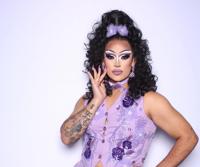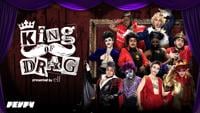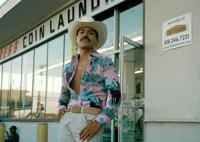National audiences got to know Salina EsTitties during her run on season 15 of RuPaul’s Drag Race, but Angelenos have been witnesses to the star and activist power that is EsTitties for a decade. She’s not just a fierce entertainer, she’s also a leading voice in the queer, Latinx, drag, and sober communities.
This year, she was announced as the winner of L.A. Blade’s Best Drag Performer at our Best of L.A. Awards. She’s appeared in campaigns for Sephora, Pure for Men, Calvin Klein and more, partnering with numerous non-profit organizations that benefit the queer community and beyond. And yet somehow, she still has time to focus on her lucrative drag and music career.
Even with her continually rising star, she remains humble, down-to-earth and makes time to support events and movements that affect her communities.
This Thursday, she will join the Los Angeles Blade, Latino Media Collaborative and CALÓ News for Diálogo – Pride, Power & Progress, an intimate in-person gathering that brings together powerful voices at the intersection of journalism, identity and social impact.
EsTitties is a fierce believer in the power of the queer Latinx community in Los Angeles and knows firsthand the work that is being done.
“There are leaders in the community that people don’t even realize are out there, going to work for the community, for us as a whole and not just Latinos, but for queer people in general, like trans and trans youth,” she said in an interview with L.A. Blade. “When you go to any function that is a Latino function, there are people who are actually in the streets doing the work.”
EsTitties is all too familiar with the struggles that the organizations she supports are going through, especially as the current administration continues to restrict resources.
“There are people losing jobs who are doing this good work. The leaders of the Latin community are the ones out there in the streets who are actually helping the community,” she continued. “They’re my heroes at the end of the day because it’s those kinds of people who helped me when I was 19, 20 years old, running the streets, homeless, on drugs. They were there for me at those times and their resources provided me with a life that I have today beyond my wildest dreams. I get to twirl around in a wig, you know, but they’re the ones who are out there saving the world.”
EsTitties is also changing the Latinx culture from within. Her presence as a drag queen and a queer (as she puts it) cholo, challenges the machismo norms that are expected of men, changing the narrative of through representation. Her work is a direct result of her early experience.
“It was such a struggle for me in the beginning, especially when I started drag when I was 23. I was so insecure and so hyper-fixated on the masculinity of it all. So I cut my hair off and I quit drag,” said EsTitties, adding that she then landed a job at In-N-Out. “The machismo of it all is something that I grew up with, especially growing up in the hood. I had to acclimate — oversized white tee, baggy blue jeans and Air Force [shoes]. That was the vibe — no color, no queerness, no nothing. I had to present as much as I could to not stand out so I wouldn’t get picked on. Internalized homophobia is very real and toxic masculinity is very real inside of me.”
Eventually, EsTitties did return to drag and it gave her confidence and the voice she now uses to fight for her communities. Over the years, drag taught her how to combine both her masculine and feminine traits in a way that was real for her, embracing her full identity. From her vantage point, she views machismo differently now.
“I’m attracted to masculinity. I don’t think it’s something we have to demonize or villainize, it’s about not making it greater than. I think we’re all equal, I think everyone has all shades of the rainbow, right? I can be feminine, I can be masculine, I can present feminine and still be butch as fuck. It’s all sexy at the end of the day, but I think confidence is where you use it for good as opposed to evil.”
The queer voice in the Latinx community grows stronger every day. Younger generations are gaining the courage to be themselves, not worried about the pressures of conforming. EsTitties says that queer people have always been visible in the community and gives credit to the women of the family — the tias, the mothers, the grandmothers — for showing unconditional love and fostering a vibrant queer community.
As EsTitties prepares to join an impressive panel for Diálogo for a conversation that explores the evolving landscape of Latinx journalism and its vital role in advancing equity, representation and social change, she believes that talk of immigration and the current U.S. Immigration and Customs Enforcement (ICE) raids be at the forefront of any queer, Latinx talk.
“The reality is that I’m sure you know someone, who knows someone who’s undocumented, but there’s a big stigma around that. We’ve heard it from our President that [undocumented immigrants] are rapists, drug dealers. That’s not the truth,” said EsTitties. “My mom came here, undocumented, got her citizenship, then did everything that she needed to do after the fact. And if it wasn’t for my mom doing those things, I wouldn’t be here for it. I am still learning how to navigate it all. This is a conversation that’s very taboo and people just like to pretend it doesn’t exist. But it’s a very real thing that we’re watching in real time.”
EsTitties stressed the importance of the queer community being involved in these conversations because they are issues that affect communities that intersect with other marginalized communities that are particularly vulnerable right now, such as the undocumented immigrant community.
“At the end of the day, we’re human beings. No one should be treated the way that they’re treating human beings right now. Seeing what’s going on right now with ICE is so scary. I know people who are afraid to leave their homes. I have friends who are dyeing their hair a different color every day, so they seem less brown. I have friends who are covering up their tattoos because they think they’re looking for them. People are paranoid and scared right now.”
EsTitties knows that stigma and racism exist even within our own community. That is a reason she works so hard at being visible and active.
“[We need to have a] conversation of just knowing that we Latinos and queer Latinos are not less than our white counterparts. We see white gays running the world, baby. I just hope that I can be one of those people who is like: ‘I’m going to do it regardless of whether you think I can or not, whether you’re rooting for me or not.'”
EsTitties says that in her experience, the queer, Latinx community is often “the butt of the joke a lot of the time.” She says that her communities often have to work ten times harder to get places.
“We’re having to fight a lot of stigma, fight a lot of prejudice, but the thing with Latinos is that we don’t let that weakness show. That confidence and strength, and our passion and our fire, that’s what continues to keep us here and moving. So I think we lean in and continue to be unapologetic, and I think just be a little louder, especially right now.”
Join EsTitties, CALÓ News and Los Angeles Blade for the Diálogo series, Thursday, June 26th at 6 pm at The Abbey. The event is free; RSVP here.










(0) comments
Welcome to the discussion.
Log In
Keep it Clean. Please avoid obscene, vulgar, lewd, racist or sexually-oriented language.
PLEASE TURN OFF YOUR CAPS LOCK.
Don't Threaten. Threats of harming another person will not be tolerated.
Be Truthful. Don't knowingly lie about anyone or anything.
Be Nice. No racism, sexism or any sort of -ism that is degrading to another person.
Be Proactive. Use the 'Report' link on each comment to let us know of abusive posts.
Share with Us. We'd love to hear eyewitness accounts, the history behind an article.